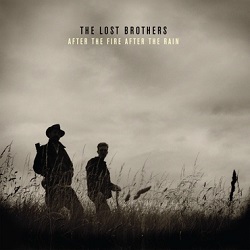
 The Lost Brothers recorded this, their sixth album, in New York with production duties shared between Daniell Schlett and Tony Garnier. As Dylan’s longest serving bass player Tony Garnier naturally also brought some upright bass to the sessions – and naturally, ‘cos it’s that kind of story, the bass used once belonged to Charles Mingus. So there were some legendary elements hanging around the duo of Oisin Leech and Mark McCausland – and there’s that sense of an epic tale being unfolded to ‘After the Fire After the Rain‘.
The Lost Brothers recorded this, their sixth album, in New York with production duties shared between Daniell Schlett and Tony Garnier. As Dylan’s longest serving bass player Tony Garnier naturally also brought some upright bass to the sessions – and naturally, ‘cos it’s that kind of story, the bass used once belonged to Charles Mingus. So there were some legendary elements hanging around the duo of Oisin Leech and Mark McCausland – and there’s that sense of an epic tale being unfolded to ‘After the Fire After the Rain‘.
It’s an album with strong Irish touchstones woven through the lyrics – and yet these are framed within the soundtrack of a dusty western: it couldn’t sound more like lost souls wandering through an endless American desert. Maybe it’s the influence of guests musicians such as Howe Gelb.
So when the song ‘Fugitive Moon‘ speaks of “standing where the Boyne flows / who knows where the time goes?” it’s with a lonesome vocal which vibrates to the echoes of distant drumming rolling across a vast and empty plain of drumming, with plaintive stabs of harmonica just adding to the unsettling sense of isolation. Open spaces are a recurring theme – although the upbeat and decorated with brass notes ‘Wilderness‘ takes a celebration of solitary exploration and marries it to a spiritual awakening “then comes a voice from above telling me to begin again and I have no choice but to heed the call and get up again“. It’s a song that’s one part Lee Hazelwood mixed with a baroque sensibility stirred in from sixties songwriters like Harry Nilsson, indeed the opening bars echo his ‘Sister Marie‘. There’s more of a sixties alternative-folk feel to the pleasantly strange and opaque ‘Hope Machine‘ which, without batting an eyelid, twists itself into knots of contradiction “do you know how frail the hope machine? Not frail, the hope machine“. It’s like the camp fire ramblings of a sunstroke victim somewhere out near Death Valley.
Not surprisingly there’s a touch of Dylan influence on the album as well – all those years in the band have clearly left their mark on Tony Garnier – the tentative, haunted, banjo on ‘Venus‘ has surely been lifted whole from ‘Scarlet Town‘ – but it’s just a borrowing and after all isn’t that the true folk way? It’s an eerie song, with the ghostly banjo counterpointed by a spectral scratch of fiddle – it sounds ageless and threatening, less a love song than the premeditation before the enactment of a murder ballad. There’s a similar sense of unease to the opening and half the title track ‘After the Fire‘ – which may roll along like it wants to break out and rock like the Everly Brothers but is about real loss and grief from an actual fire, rather than an allusion to an emotional state: “after the fire they found ashes near the wheel / at the grief seminar they said ‘your loss is real’ after the fire“. There’s some closure with the album closer and other half of the title track ‘After the Rain‘ whose soft folk-rocking acts as something of a calming balm after an emotionally intense and richly rewarding album.



Could be one of the 10 best albums of 2020. Absolutely brilliant